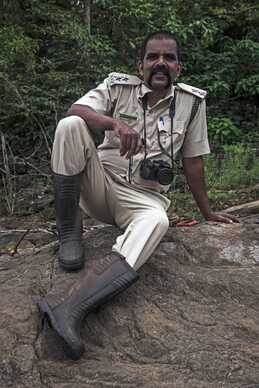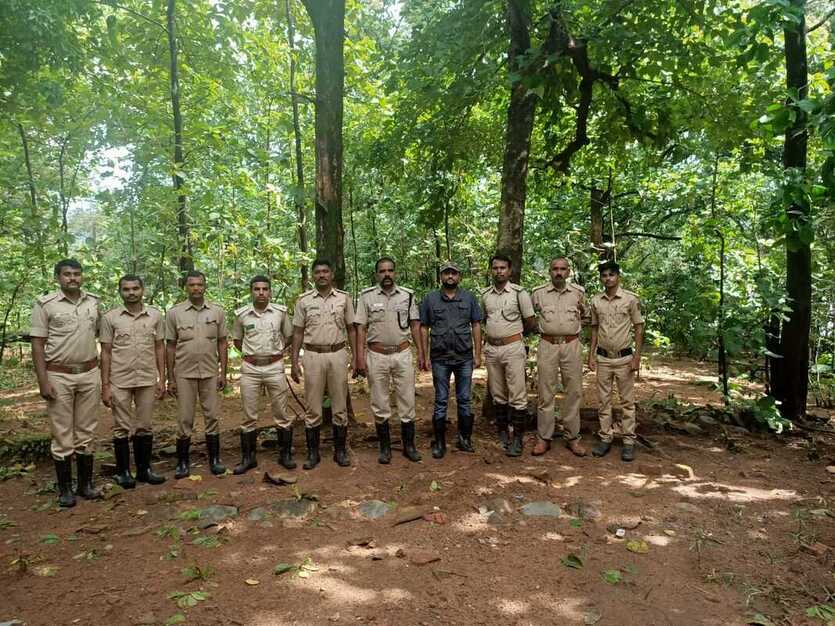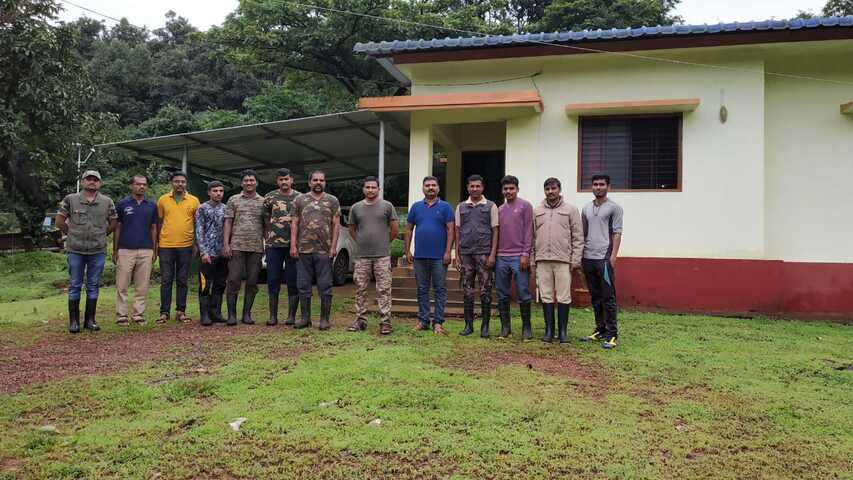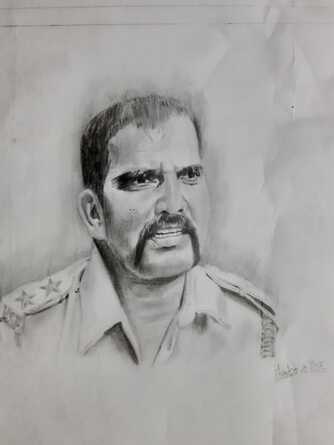|
Mr. C.R. Naik, a Deputy Range Officer working in the Karnataka Forest Department, was interviewed by YNN member, Ekadh Ranganathan, as part of our World Ranger Day initiative to highlight the stories of local guides, forest rangers and other such unsung field workers. Mr. Naik and his team work regularly on animal rescues and awareness-building activities. Mr. Naik has immense knowledge about almost everything that lives in the forest and discovered a new species of frog, the Karaavalli Skittering Frog. He has delivered talks at IISc, NCBS and other reputed institutions about wildlife and his work.
The members of Mr. Naik’s team are: Prasanna A, Gururaj Gouda, Ramesh Badiger, Parashuram Bajantri, Shankaranand Iddimani, Sadanand Ganagi, Gopal Naik. D, Gopalkrishna Hegde, Mohammad Bilal Shaikh, Laxman Kheeru, Parashappa Jajappagol, Gundappa Kuri and Mahabaleswar Kotagi. |
I had a good childhood but it came with its own share of difficulties. My father worked as a forest guard in the Karnataka Forest Department and my mother had to take care of everyone including herself, my three sisters, my grandmother and me, all with only Rs. 490 per month. We were so poor I couldn’t even afford slippers and had to walk to school barefoot. My father passed away and his job came to me. I was supported by my uncle and I tried completing school as quickly as I could, with the best possible grades. I was a good student and scored decent marks in science and social science, but never maths. It always eluded me for some reason. I even began my BA, but I wasn’t able to complete it.
As a child, I would throw stones at Spotted Doves, Cattle Egrets and Blue-eared Kingfishers. I would even try to hit snakes when I saw them! I guess I was like any other child- curious but also looking to have some fun. All of this changed after I joined the force. I didn’t have any academic background in wildlife and had gotten into the service based on compensation for my father’s demise and my 10th standard mark sheet. I was given training in Tattihalla Forest Training Institute, not far from Dandeli. It was here that I first learnt the true importance of nature and the forests. As I underwent training and joined the force as a forest guard, my curiosity and thirst for knowledge grew, and I started to learn simply because I was truly interested. As a forest guard, I spent almost all my time in the field; this gave me the opportunity to observe new species and learn more about wildlife.
Since then, I’ve made tons of wonderful memories and met some great people. One story I always enjoy talking about is the discovery of the Karaavalli Skittering Frog. As a little boy I used to love the monsoon and all the frogs it brought; it was like a festival for me. When I first saw this new frog, I knew there was something different about it. I could tell it was a Skittering frog but its claws, size and body shape weren’t like any I’d seen before. After all, in a crowd of 100 friends and acquaintances, you’d be able to tell if there was a new face, right? Discovering and describing the frog gave me immense joy; it made me feel on par with any scientist. The experience was made even better by the fact that I’d discovered it in my own hometown! I was helped by a number of people in my discovery, including KV Gururaj, K Seshadri and Preethi Hebbal. I was also encouraged by a young and supportive Forest Officer, Mr. Sunil Talwar, who told me that it wasn’t enough for my name to appear in the newspapers, it would have to appear in scientific papers too!
A major activity for me is doing snake rescues- I work with a team of 14 other people on these. There are many who rescue and handle snakes outside the forest department but there are few within the department itself. So, I take great pride in knowing that Kanara Circle, where we work, has the highest number of rescuers in the Karnataka Forest Department. At the same time, we don’t conduct rescues because of an order from the department or because someone has assigned us the task. We do them out of our self-motivation and based on our personal interests. Many in my team have fairly diverse fields of interest too. For example, my colleague Ramesh Badiger works on snake taxonomy and there are others who work on butterflies, hornbills and frogs. We see the importance of smaller animals, not just large, charismatic ones like tigers and elephants.
Working in the force has taught me that awareness is key to establishing coexistence between wildlife and humans. My team and I have been organising street plays and other awareness programmes since the Karnataka government started an initiative called Chinnaravanadarshana, which was meant to create a certain amount of awareness about nature in villages near forests, especially among children. We organise plays on many topics and my colleague Parasappa does a lot of the scripting. Even when we go on animal rescues, we try to explain to people why animals leave the forest, what needs to be done when you encounter one and we encourage them to build healthy relationships with wildlife.
One thing that does upset me though, is how some people from big cities treat forests. Don’t get me wrong, not all city-dwellers are bad. Many volunteer and help us when we are doing plastic cleanup drives or fighting forest fires. But there are some who do not truly understand the value of a forest- they simply see it as a dustbin or a nice place to party and play loud music. Such people should understand that forests are homes to other organisms, which just like humans, require hygiene and peace. So whenever you visit the forest, I expect you to act like well-behaved school children:- disciplined and silent.
I’ve come a long way since I started off as a forest guard. Back then, the department wasn’t very supportive and they didn’t have a clear idea of what they could do or how to go about it. But things have changed now and many in the force are highly educated as well. As a Deputy Range Officer, I always try to encourage my subordinates to learn about nature and help others learn too. I even teach children about birds and birdwatching using field guides and I’ve been able to completely change the way many look at birds. It is like a dream come true! Instilling curiosity in a young child can lead you a long way after all.
I have one final request for others like me who work in forests. Apart from your normal work, think of the forest as a library. Like you would pick up a book to read at the library, pick a species or group of organisms to study. You, as a person who works in the forest 24*7, have access to it that few others have, so please use it well.
Every one of us who works in the forest service carries a bag throughout our time here- a bag filled with gold, silver and precious gems. This bag represents nature and the beautiful forests we work in and to understand the true value and beauty of nature, all we need to do is open the bag and take a look at the amazing life it houses.
The forest is your home, make sure you know it and its dwellers as intimately as you would your family.
We are thankful to Mr. Ashwin HP, a naturalist based in Mysore, who stayed on the call with us during the interview and translated what Mr. Naik said from Kannada to English. Always passionate about the wild, Ashwin started off his career as a birdwatcher and wildlife photographer. Delving into film-making and research, he has made documentaries on all kinds of subjects, from king cobras to elephants, and is a specialist on reptiles, mammals and birds. More recently Ashwin has worked as the lead naturalist in some of the best wildlife lodges in the country, including Forsyth Lodge in Satpura and Kaav Safari Lodge in Kabini.





